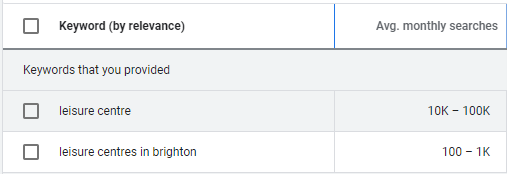3 SEO Top Tips for Leisure Operators: Get Your Website Noticed
Our SEO top tips for leisure centres and gyms
1. Keyword research - find the words and phrases people are using to search for gyms and leisures like yours2. Add meta descriptions - encourage prospective gym members to click on your page - grab their attention!
3. Use the correct header tags - separate your headings and subheadings and improve both the SEO and readability of your pages
Looking for a way to increase the number of prospective customers who find your website? You might think the answer has to involve splashing out on a load of digital advertising, but there’s a way to make your website more visible without spending a penny. It’s time to do more with SEO.
What is SEO?
SEO stands for Search Engine Optimisation and refers to the techniques used on web pages to make them appear higher up in the search results of search engines such as Google. In this digital world, when we’re looking for information most of us turn to Google and simply type in our question or phrase. For both convenience and relevance reasons, we’re unlikely to scroll through pages and pages of results before we click on something, right? Put simply, the higher up your website appears in the search results, the more likely it is that people will click on your page and drive traffic to your website. So it's time to get started…
Why is SEO important in the leisure industry?
SEO helps you get found by the right people at the right time. Visibility is crucial in this digital era, and leisure centres and gyms can no longer rely on word of mouth or outdated websites to attract new members. With relevant, quality digital content that helps users learn more about what you’re offering, you can attract the right people to your website without spending a fortune. Did you know that 81% of customers conduct a search online before they make a purchase? Your digital presence has never been so crucial.
How to use SEO to reach new audiences and attract new gym members?
In ukactive’s Digital Futures review, the varying levels of digital maturity were assessed in a selection of operators. The results show that 64% of operators admit they could be doing more with SEO. But where to start if you are looking to improve your website’s SEO? Here are our top tips:
1. Keyword research
This is all about finding out what people are searching for to find sites like yours and optimising your content accordingly. Keywords are the words or phrases that people type into search engines. A simple way to start this process is to open an incognito tab (Press Ctrl + Shift + n if you're using Windows or ⌘ + Shift + n for Macs) and start typing a search in Google to see what suggestions come up in the autofill box underneath.
For example, you might start typing ‘leisure centre’ and the suggestions that appear might be related to your location- e.g., ‘Leisure centre in Brighton’ or ‘leisure centre in Brighton with tennis courts'. You can also use Google Keyword Planner for a more in-depth look at keywords and suggestions, as well as an idea of how many people search for each phrase monthly.
 Search volume comparison between keywords
Search volume comparison between keywords
You then need to think about which keywords you’re going to target in your web pages and blog posts. Try to stick to one or two keywords per page (remember, keywords don't have to just be one word, they can be a phrase!).
Phrases such as ‘leisure centres’ will be difficult to rank for in search results as they will be highly competitive, and many searches for 'leisure centre' won’t be relevant to your own centre.
It’s suggested that you find more specific phrases to target. ‘Long-tail keywords’ are a combination of three or more words or phrases. Because they're more specific, they'll have a lower search volume but they tend to attract more relevant traffic which makes them easier to rank for. From our previous example, ‘leisure centre in Brighton’ would be a great long-tail keyword to start with! Why not write a blog post on ‘Why now is the perfect time to join a leisure centre in Brighton'? You’ve included the keyword and you’ll be providing relevant content about your leisure centre as well as handy fitness information.
Keep it simple and focus on one or two keywords per page. And don’t use the phrase too much in your blog post! This is known as ‘keyword stuffing’ and search engines will pick up on this and penalise you in the search results. Just use your keyword a few times throughout the page, as you would naturally in a conversation.
2. Add meta descriptions
A meta description is the short snippet of text that appears underneath the page title when it appears in the search results. Although it isn't a factor that search engines directly use to rank pages, it helps users get more of an idea about what the page is about, making them more likely to click on your page. Write a sentence or two to encourage searchers to choose your listing over all the others. Grab their attention! It’s recommended that you include your relevant keyword(s) in your meta description and keep it between 120-150 characters in length, so nothing gets cut off in the search results.

Example of a meta description in Google’s search results. In this example 'leisure management software' is the relevant keyword
3. Use the correct header tags
A header tag is an html tag that tells a browser how to structurally display the text in your page. Think of the collection of header tags like a table of contents. Just by scanning the headings and subheadings, search engines and readers should know what your page is about, and users find it easier to read because of a nicely laid out structure. The different header tags are:
H1 Think of this as the title. There should only be one H1 tag per page – for example in this blog post the html would look like <h1>3 SEO Top Tips for Leisure Operators: Get Your Website Noticed</h1>
H2 These are for your main topics. In this post, an example of an H2 would be <h2>What is SEO?</h2>
H3 And these are your subheadings e.g., <h3>Keyword research</h3>
And so on!
Of course, we couldn't write about SEO without optimising this article for SEO ourselves! You'll notice we've used a list at the top of the post - bullet points and numbered lists are a great way to pull out your key content and make it easily skimmable for readers. They also make it easier to rank in Google 'Snippets', the short snippets of text that appears at the top of the search results. Give it a try!
There are so many more ways to improve your SEO, we're just scraping the surface here. Just remember the goal – you want your website to be found by the right people at the right time.
Want to learn more SEO tips and dive into how you measure and report on SEO? We’re working on a new project for our operators which will offer more in-depth marketing information and advice specifically for leisure operators so stay tuned! If you haven’t already, why not subscribe to our blog to be amongst the first to hear of product insights and fresh marketing advice?
Share this
You May Also Like
These Related Stories
-min.png)
Marketing Personas: Why One Size Doesn't Fit All in the Leisure Industry

Centre Management: One of the Many Benefits of Moving to the Cloud




No Comments Yet
Let us know what you think